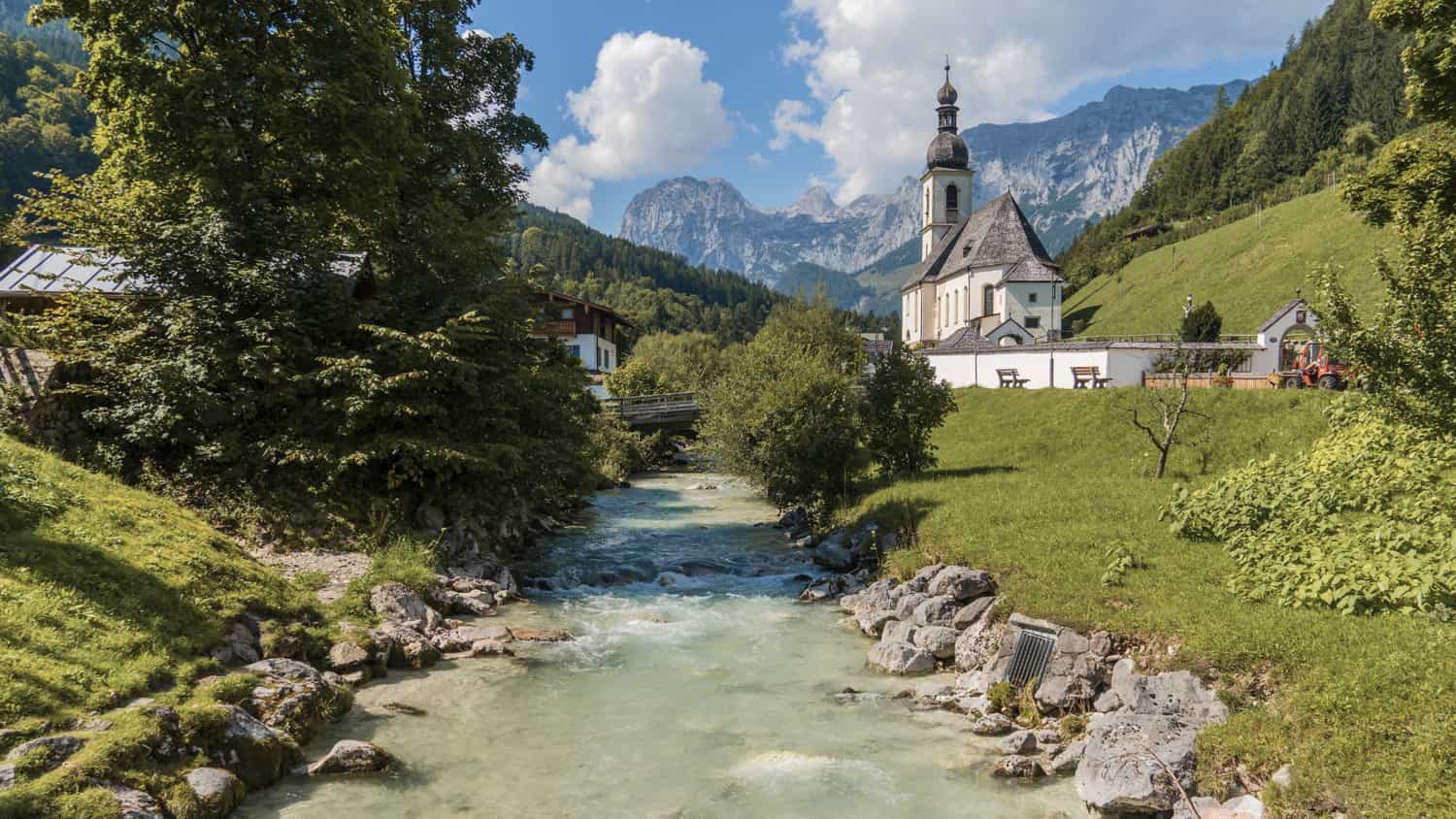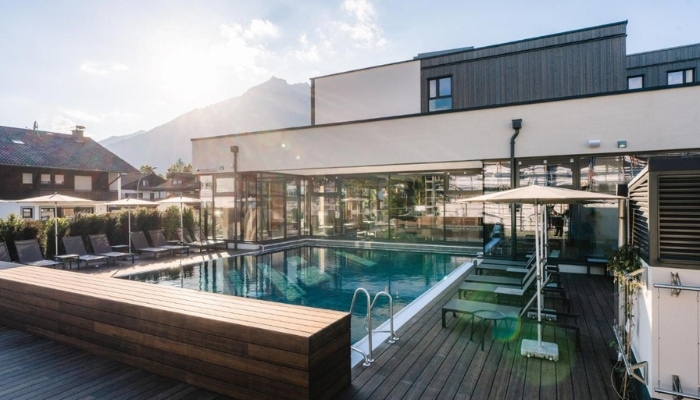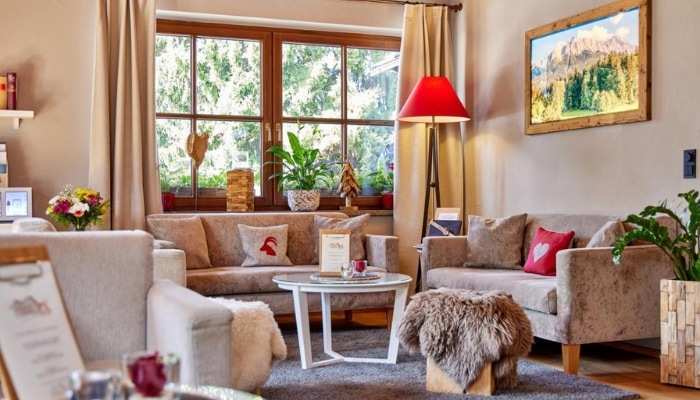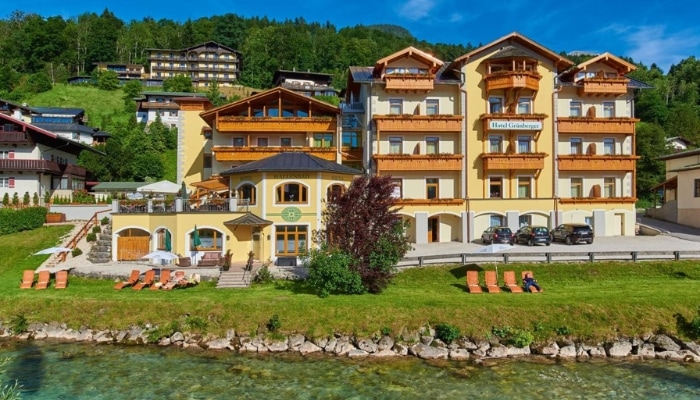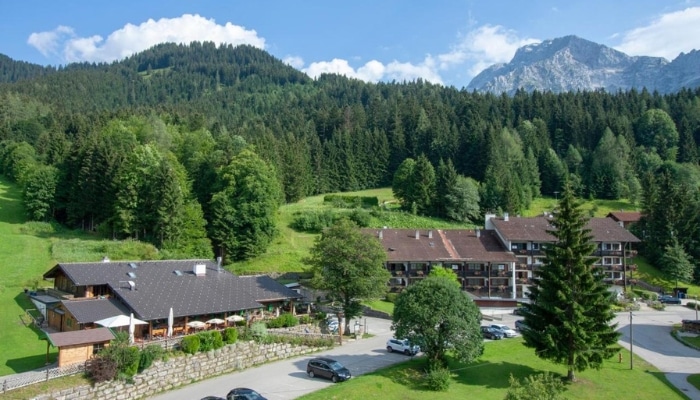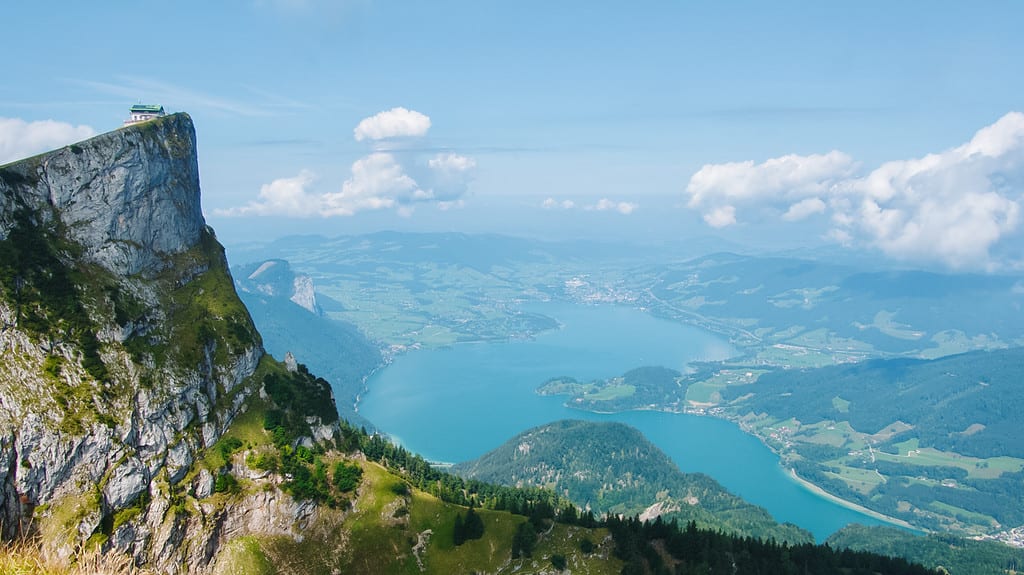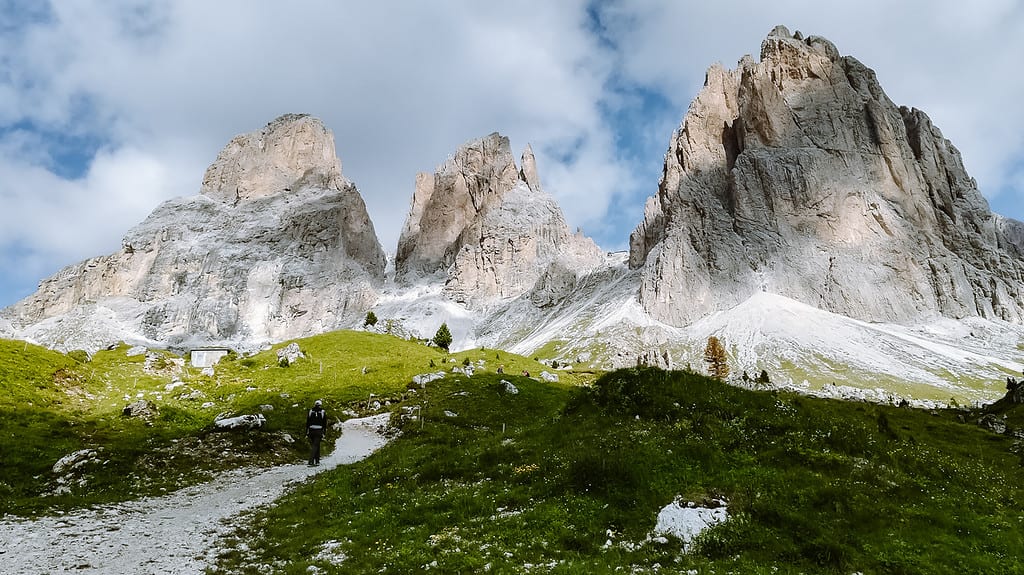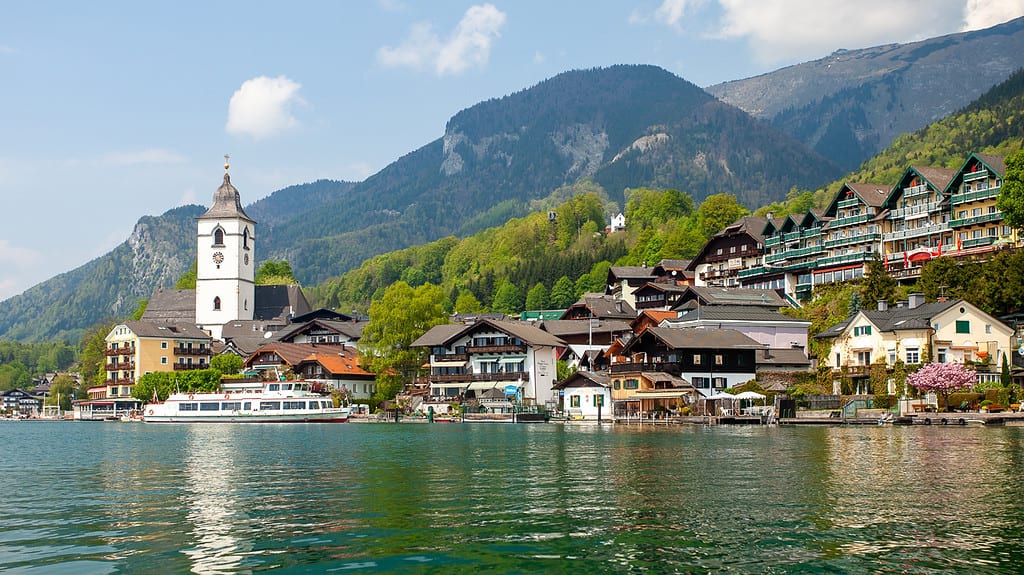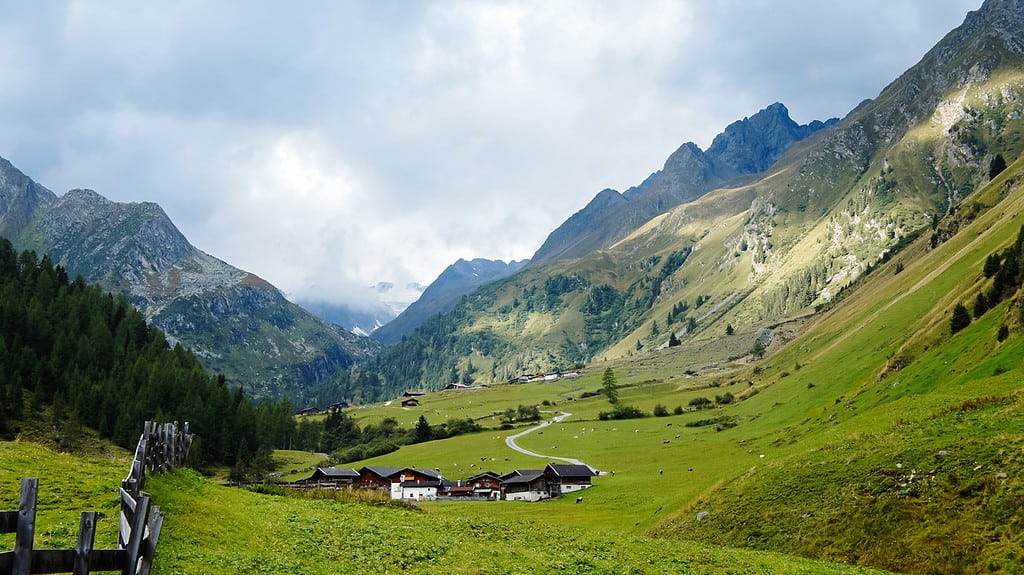Visit the Bavarian Alps, where beautiful nature, wild gorges, crystal clear lakes and peaks combine to offer breathtaking views. Today we show you the most beautiful places in Bavaria with tips for trips and hiking routes to the Bavarian Alps for your holiday. Enjoy the best things to do in the Bavarian Alps this summer, whether you’re travelling as a couple or with your family.
The Bavarian Alps are criss-crossed with hiking trails, gorges, lakes, but also beautiful castles and palaces. Today, we’ll show you the most beautiful places – a little bit of everything, so you can get an idea of what you’re in for. Join us for a look at what to see in the Alps in Germany.
- Things to do in Bavarian Alps, Germany: Best hikes
- 1. Breitachklamm – hiking in Bavarian Alps
- 2. Fellhorn, Bavarian Alps
- 3. Freibergsee, Bavarian Alps
- 4. Seealpe – Nebelhorn
- 5. Schrecksee, Bavarian Alps
- 6. Zugspitze and Eibsee
- 7. Partnachklamm, Bavarian Alps
- 8.Neuschwanstein Castle
- 9. Hohenschwangau Castle
- 10. Höllentalklamm
- 11. AlpspiX viewpoint
- 12. Linderhof Castle
- 13. Walchensee
- 14. Jochberg
- 15. Herzogstand
- 16. Leutaschklamm
- 17. Rossfeld Panoramastraße
- 18. Königssee and Obersee
- 19. Almbachklamm
- 20. Hintersee
- 21. Herrenchiemsee Castle
- 22. Salt mine Salzbergwerk Berchtesgaden
- 23. Eagle's Nest
- German Alps – map
- More information about Germany
Things to do in Bavarian Alps, Germany: Best hikes
1. Breitachklamm – hiking in Bavarian Alps
The Breitachklamm is one of the deepest and most spectacular rock gorges in Central Europe, carved out of the rocks by the Breitach River. The gorge is known for its wild beauty and dramatic rock formations.
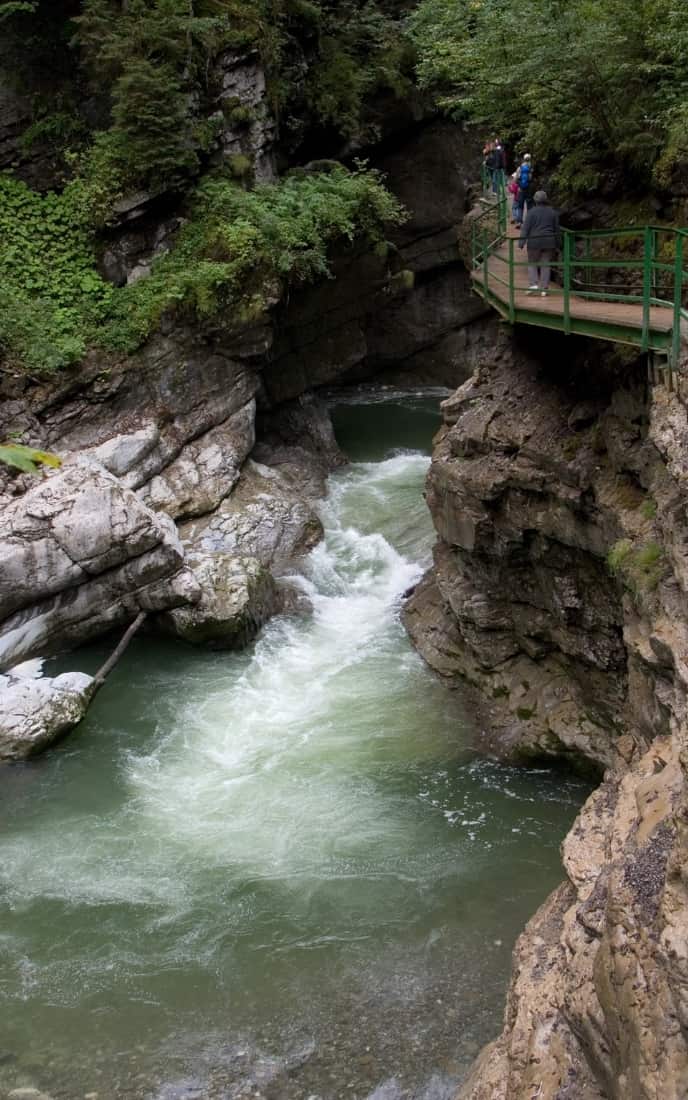
The chain is approximately 2.5 kilometres long and in some places reaches a depth of 150 metres. Here you can see a series of waterfalls and steep rock walls along wooden bridges and walkways.
Breitachklamm is open all year round and especially in the summer months, be prepared for crowds of tourists. In winter there are beautiful icefalls.
You can find up-to-date information on opening times and admission fees at this link.
2. Fellhorn, Bavarian Alps
The Fellhorn is a 2,038-metre-high mountain peak located in the Allgäuser Alps on the border between Germany and Austria.
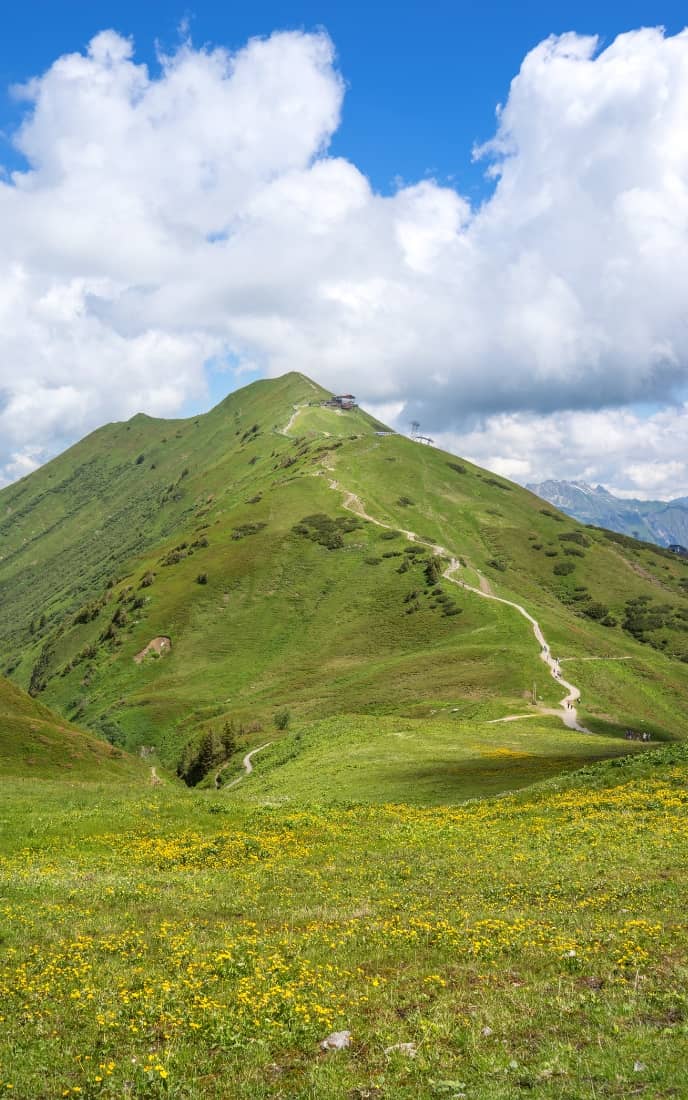
The area around the Fellhorn is famous for its beautiful alpine meadows, which from June bloom with wild flowers including alpine roses. In winter, the area turns into a popular ski resort, which is part of the Oberstdorf/Kleinwalsertal ski area.
The summit is reached by the Fellhornbahn cable car, which is open all year round. There are hiking trails in the area, including an easy trail along the ridge that offers fantastic views. Visit the Schlappoldsee and the Schlappold, the highest alpine pasture in Germany, where there is also a restaurant and playground.
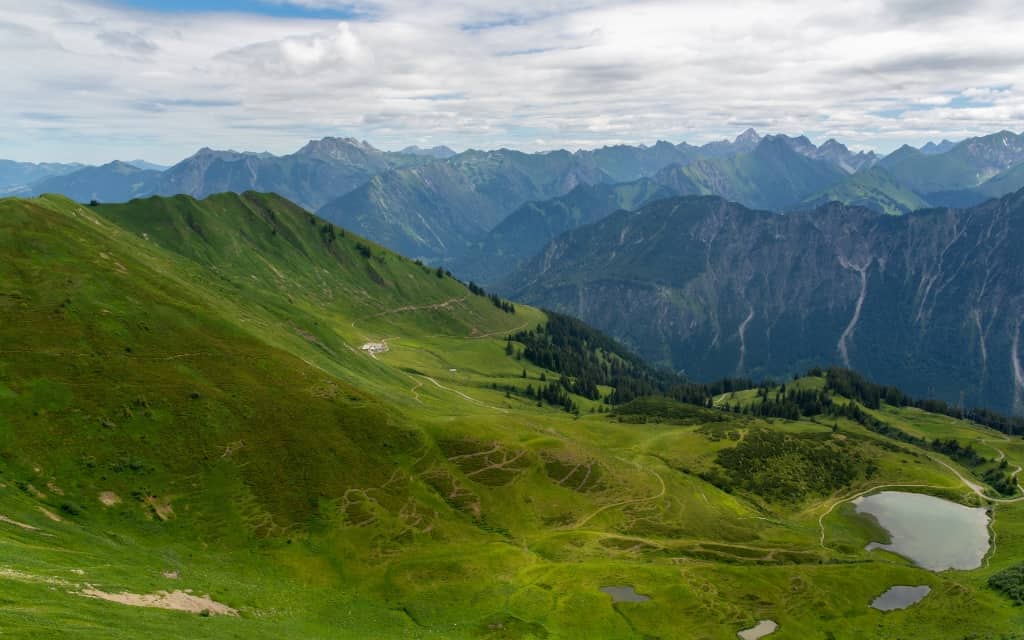
3. Freibergsee, Bavarian Alps
The Freibergsee is the largest alpine lake in Germany, surrounded by dense forests with spectacular views of the surrounding mountains.
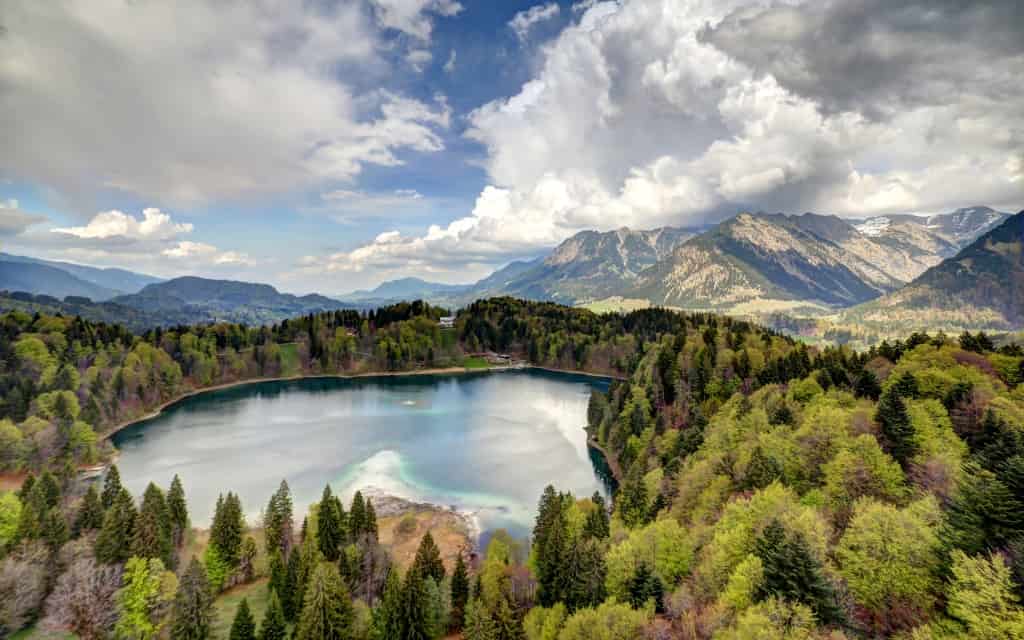
It is close to the town of Oberstdorf, where you can park in the paid parking lot and take the easy uphill route to the lake (30-minute walk).
In the summer months, the water temperature rises up to 25 degrees Celsius. Near the lake there is a natural swimming pool with a beach and a hotel with a restaurant.
The surrounding area is interwoven with easy hiking trails, from where you can go to the ski jump or below the Söllereck peak, where there is a restaurant and a playground for children (the Söllereck peak can also be reached by cable car from Kornau).
4. Seealpe – Nebelhorn
At 2,224 metres, the Nebelhorn is one of the highest peaks in the Allgäus Alps. The Nebelhornbahn cable car, which is open all year round, takes you to the top. From the station at the top you have a fantastic view of the surrounding landscape, including a view of more than 400 peaks in the Alps in good visibility.
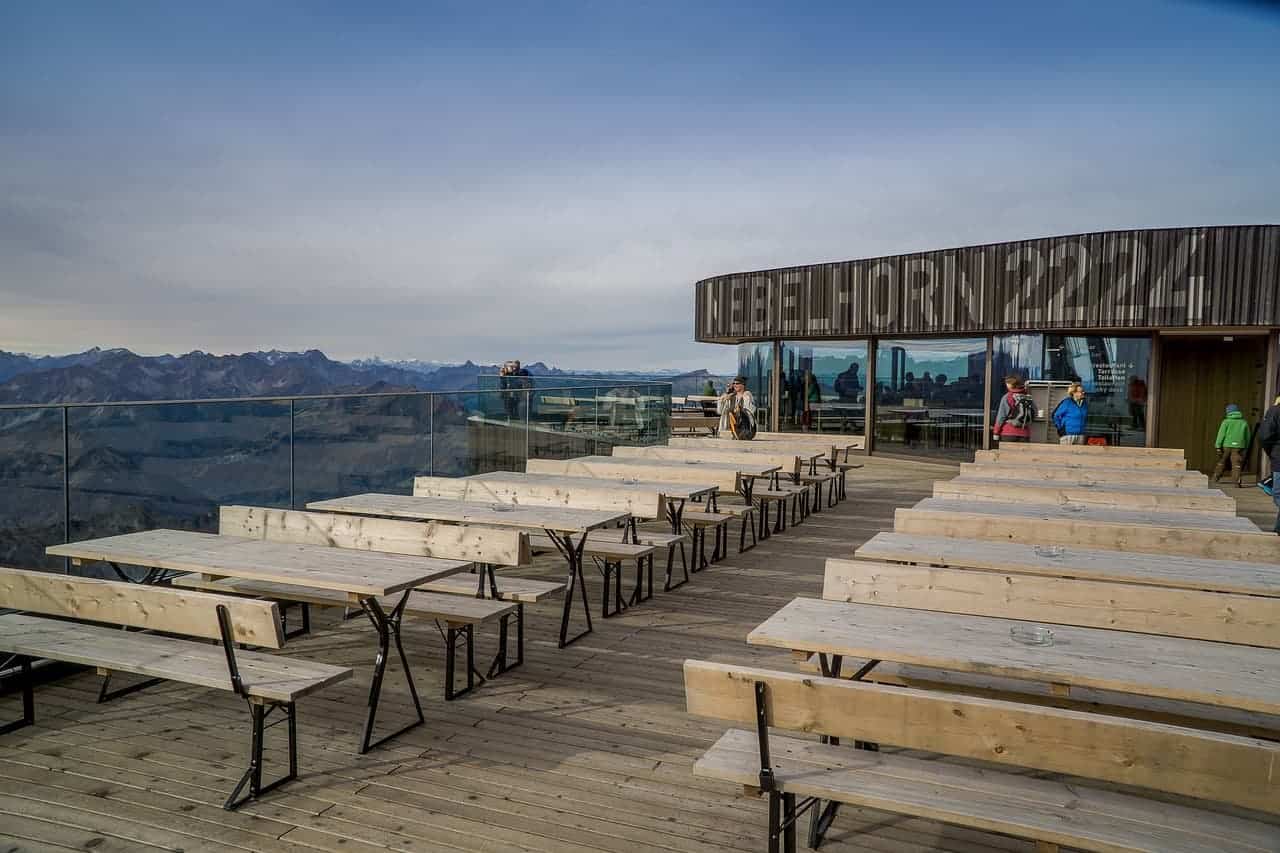
You can also climb the peak on your own – you can expect a full-day hike with an elevation gain of just under 1,400 metres.
The cable car is divided into 3 parts:
- The first part leads to the Seealpe restaurant, ideal for families with children, with a playground and easy trails.
- The second part of the cable car drops you off at the Edmund-Probst-Haus mountain hut, from where you can go on alpine treks. If you head towards the Zeigersattel mountain saddle, you will have a wonderful view of the Seealpsee.
- The last part of the cable car takes you to the top of the Nebelhorn with a restaurant and fantastic views
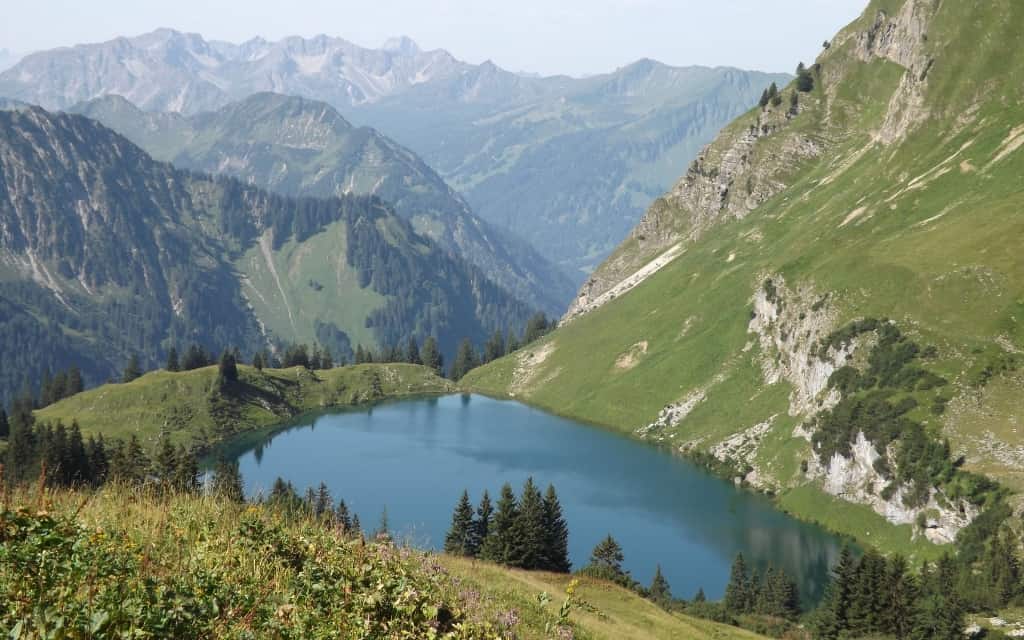
5. Schrecksee, Bavarian Alps
The Schrecksee is a picturesque mountain lake in the Allgäuser Alps, which, with an altitude of 1,813 metres above sea level, is one of the highest lakes in Germany.
The lake is surrounded by mountain peaks and meadows, which are covered with colourful alpine flowers in the summer months. The way up is challenging and leads over uneven, rubble terrain that is relatively steep in places. With good physical condition you will be up in 2.5 hours.
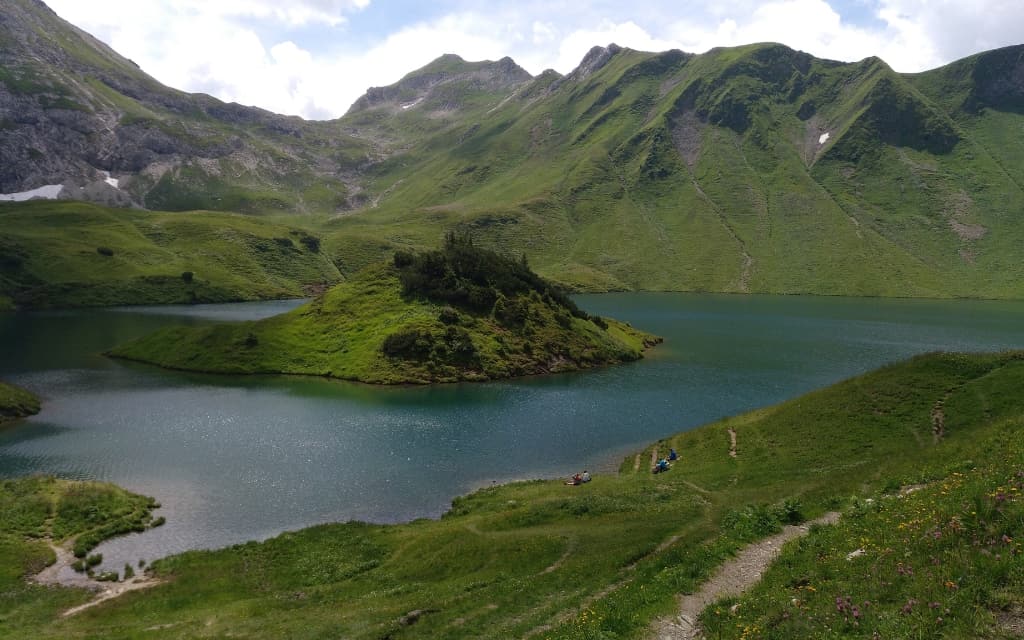
The starting point is the paid parking lot behind Hinterstein (usually full early in the season). An even better option is to take the bus from Bad Hindelang, as you will save yourself the journey from the car park.
Plenty of water, food and good shoes are a must.
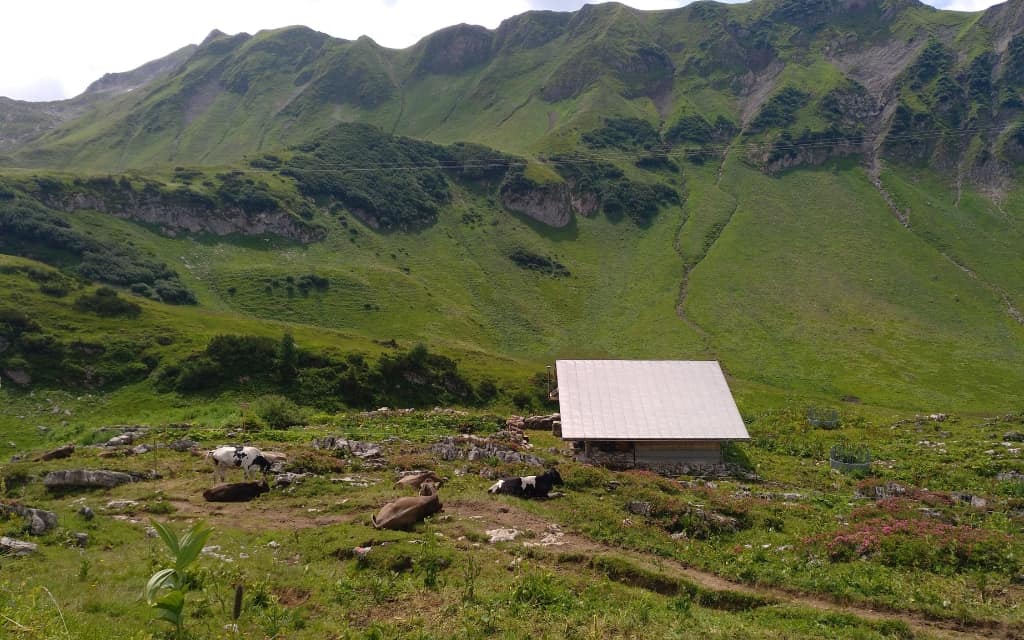
The best accommodation in the Allgäus Alps:
- Hotel Bergflair: Fantastic, stylish hotel with mountain views, spa and excellent cuisine
- Prinz-Luitpold-Bad: Traditional Alpine hotel nestled in the mountains, with views, excellent food and a swimming pool
- Rothenfels Hotel & Panorama Restaurant: Cozy, newly renovated hotel with lake view and complete facilities
6. Zugspitze and Eibsee
The Zugspitze (2962 m) is located on the border between Germany and Austria and is the highest peak in Germany. You can reach the top by a comfortable, modern cable car, from where you can enjoy spectacular views of the surrounding area. Among other things, to Lake Eibsee, which lies at the foot of the Zugspitze.
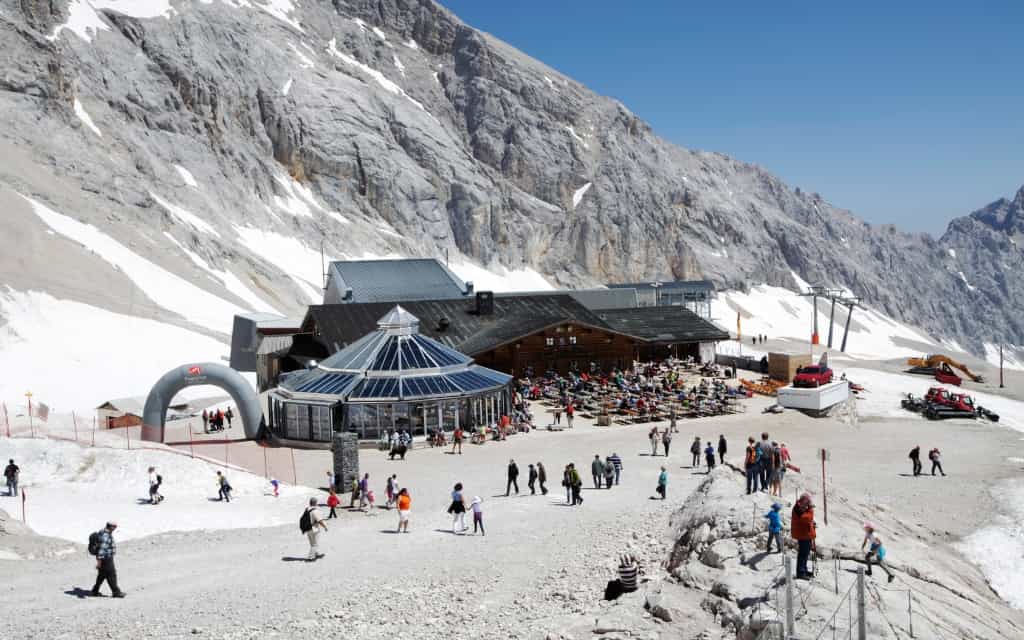
The Eibsee is a popular excursion in the Bavarian Alps. There is an easy, well-maintained trail that is ideal for families with children, strollers and bicycles. The tour takes an hour or two depending on how often you walk around.
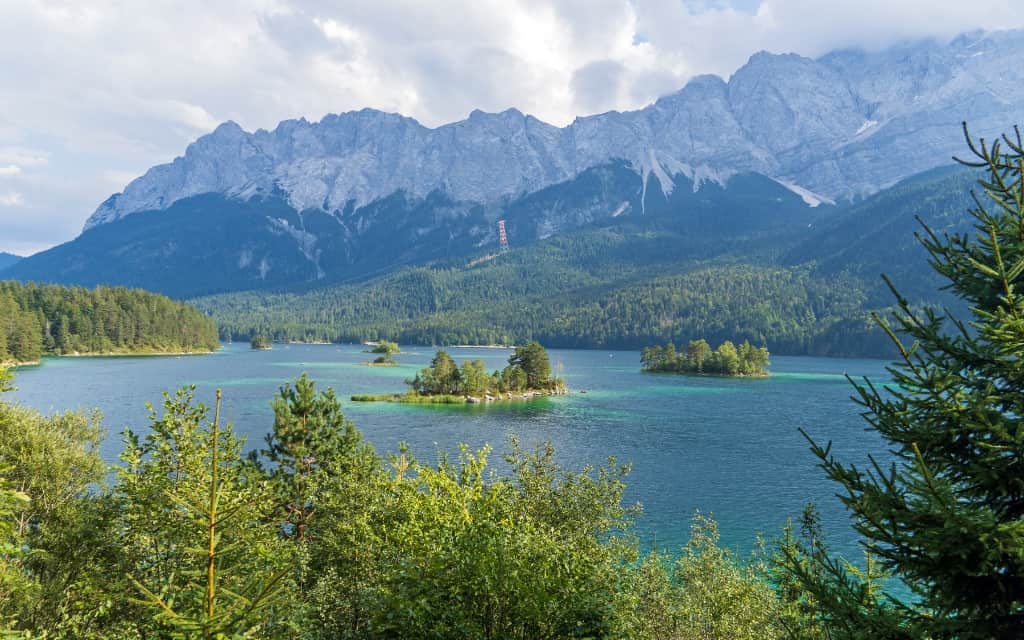
The starting point for the Zugspitze and the Eibsee is the large pay parking lot, where the lower station of the Zugspitze cable car is located.
You can find more information about the Zugspitze cable car at this link. The upper station of the cable car is also a restaurant and a viewing platform. There are belayed trails in the area that you can go down if you have experience with alpine terrain.
7. Partnachklamm, Bavarian Alps
Partnachklamm is a beautiful and wild gorge near the town of Garmisch-Partenkirchen, which is a popular winter sports resort.
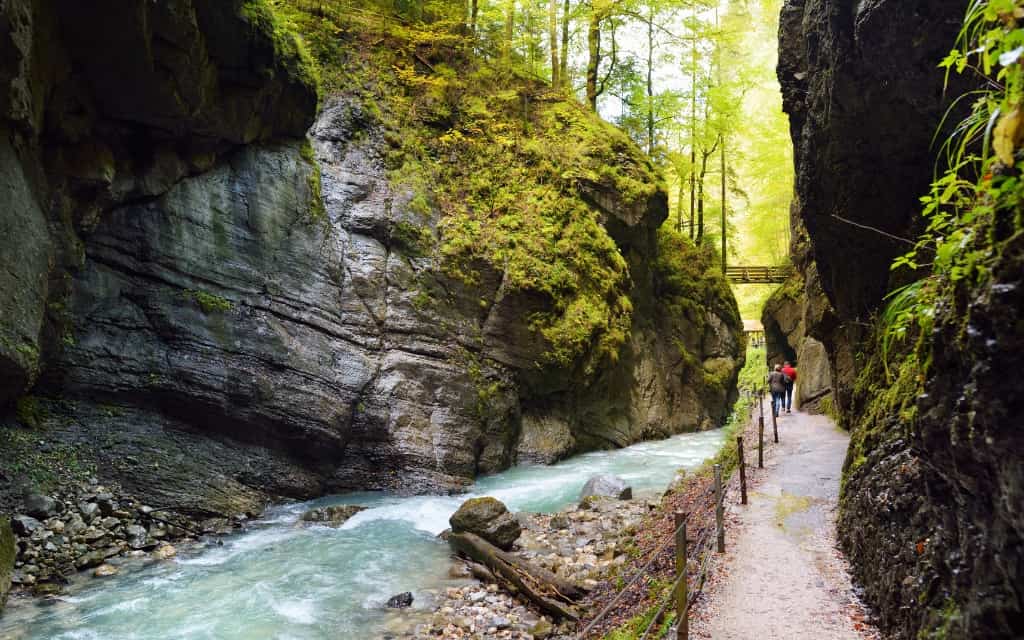
The chain is approximately 700 metres long and in some places reaches a depth of 80 metres. It is formed by the Partnach River, which flows through the wild landscape and creates waterfalls, deep pools and water flows.
You walk through the gorge on pavement and bridges that are suspended high above the river.
In winter, Partnachklamm turns into an ice wonder, when the water from the waterfalls freezes and creates beautiful ice sculptures.
Here you can find the current opening hours and entrance fees to the Partnachklamm Gorge.
8.Neuschwanstein Castle
Neuschwanstein Castle is one of the most beautiful places to visit not only in the Bavarian Alps, but also in the whole of Germany. Iconic castle inspired by Walt Disney’s Sleeping Beauty Castle.
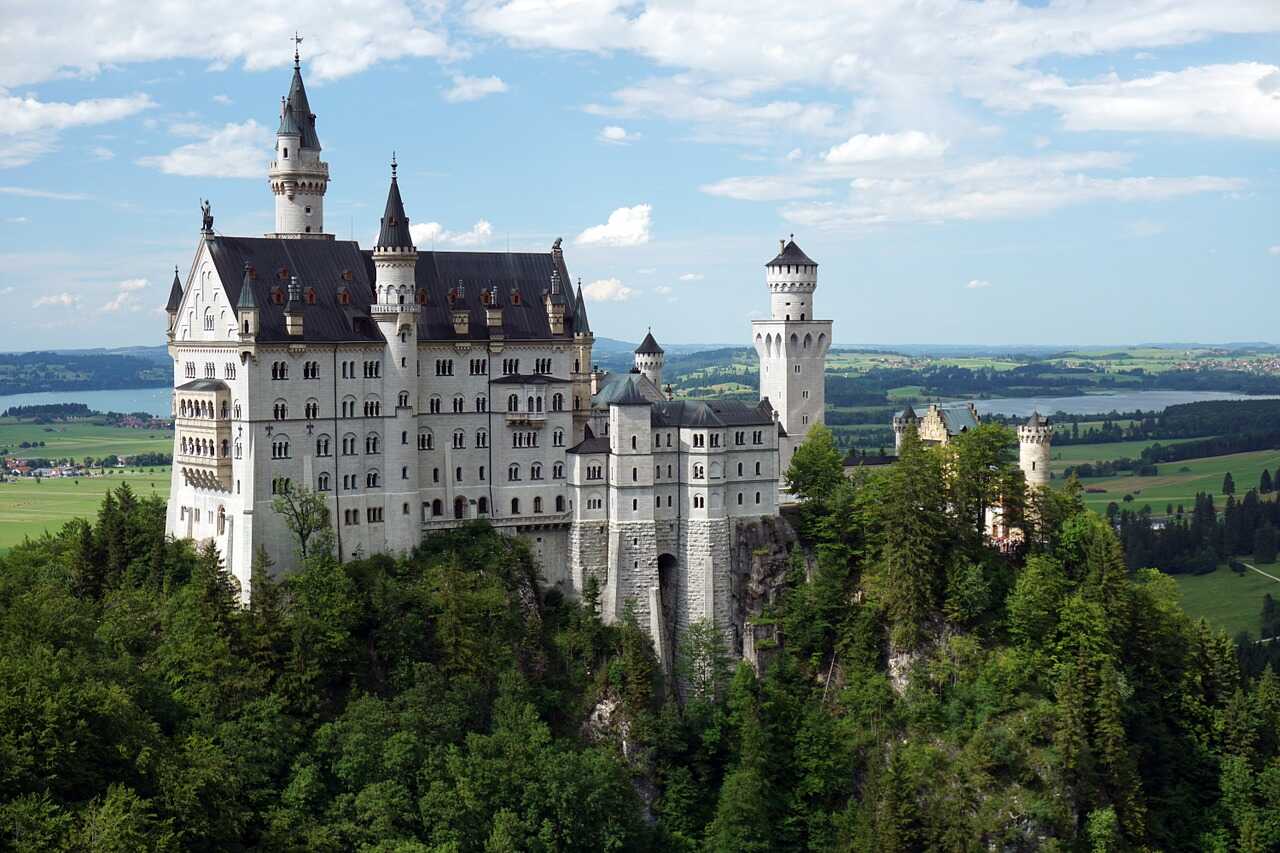
Neuschwanstein was built at the end of the 19th century by order of King Ludwig II of Bavaria, who is often referred to as the “Mad King”. Ludwig II had the castle built as his private retreat and as a tribute to Richard Wagner, his favourite composer, on whose music he was addicted.
Neuschwanstein Castle is located on a high cliff overlooking the village of Hohenschwangau and is surrounded by mountains and beautiful alpine scenery.
There are a number of viewpoints in the area from where you can get the best photos of the castle – the best is the Marienbrücke bridge (see photo above), but I recommend continuing on, as you will get a completely different view of the castle.
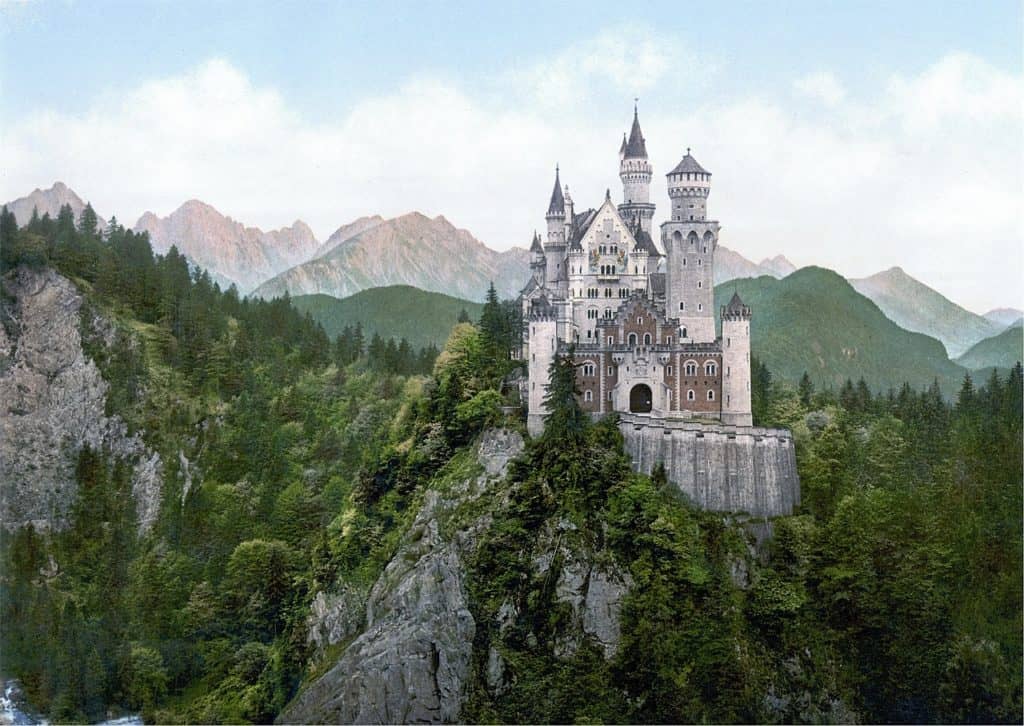
How to get to Neuschwanstein Castle: there are paid parking lots right in the village of Hohenschwangau. From the ticket office, it’s about a 30-minute uphill walk to the castle. You can also take the bus for a fee (buy your ticket from the driver).
Tickets for Neuschwanstein: the castle is extremely popular and in high season tickets sell out weeks in advance. Book well in advance.
9. Hohenschwangau Castle
Hohenschwangau towers above the village of Hohenschwangau, surrounded on all sides by beautiful nature.
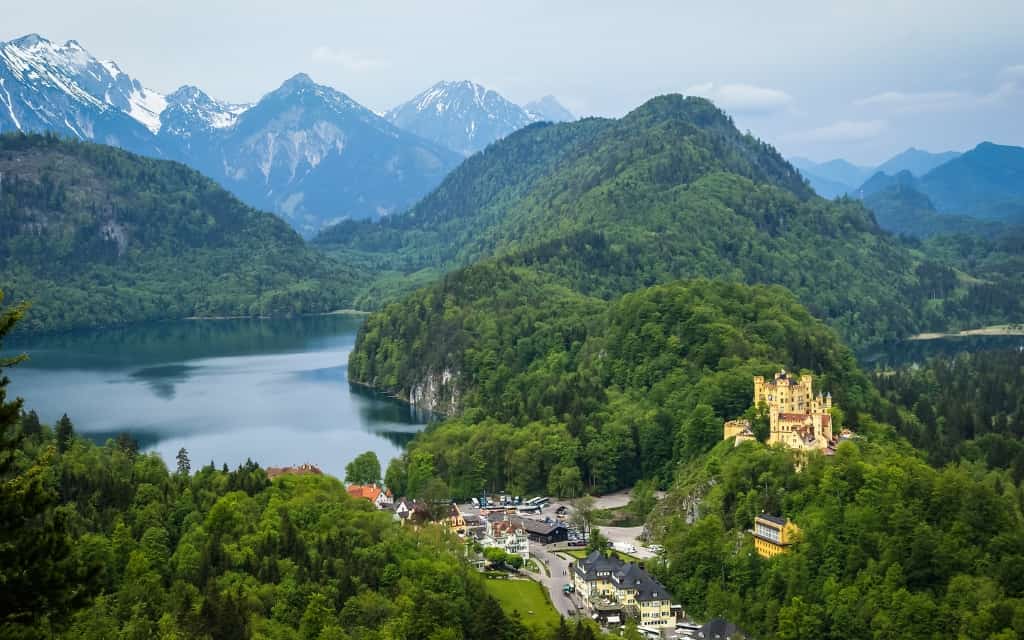
The history of Hohenschwangau Castle dates back to the 12th century, although the current building dates mostly from the 19th century. After centuries of war and neglect, the castle was in ruins when it was discovered by King Maximilian II of Bavaria, father of King Ludwig II. Maximilian bought the ruins in 1832 and had the castle restored.
How to get to Honeschwangau Castle: The castle is located a short distance from Neuschwanstein Castle. Parking and ticket sales are shared with Neuschwanstein Castle.
Tickets: Hohenschwangau Castle is not as busy as Neuschwanstein Castle. Tickets can also be bought on the door, but if you want to be sure, book here.
10. Höllentalklamm
The Höllentalklamm is another of the breathtaking gorges located near the town of Garmisch-Partenkirchen, not far from the Partnachklamm Gorge.
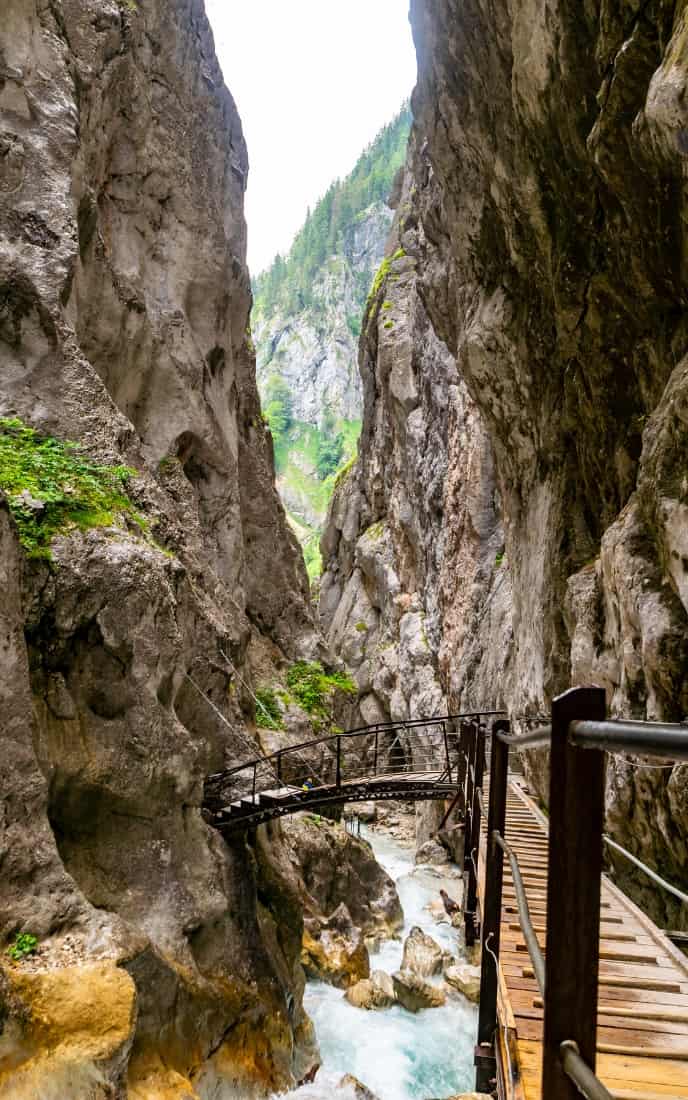
The confluence was created by the Hammersbach River and is known for its high waterfalls, deep pools and steep rock walls. It is approximately 1 kilometre long and reaches a depth of over 150 metres.
Unlike the previous gorges, you can only explore the Höllentalklamm from May to October. It is often part of longer hikes around the Wetterstein mountain range, which is part of the northern limestone Alps.
Here you can find the current opening hours and entrance fees for the Höllentalklamm.
11. AlpspiX viewpoint
The AlpspiX viewpoint is one of the most popular excursions in the Garmisch-Partenkirchen area. The Alpspitzbahn cable car will take you to the top or you can make the ascent in 2-3 hours. The views from here are fantastic and there are other hiking trails and a ferrata to the top of the Alpspitze.
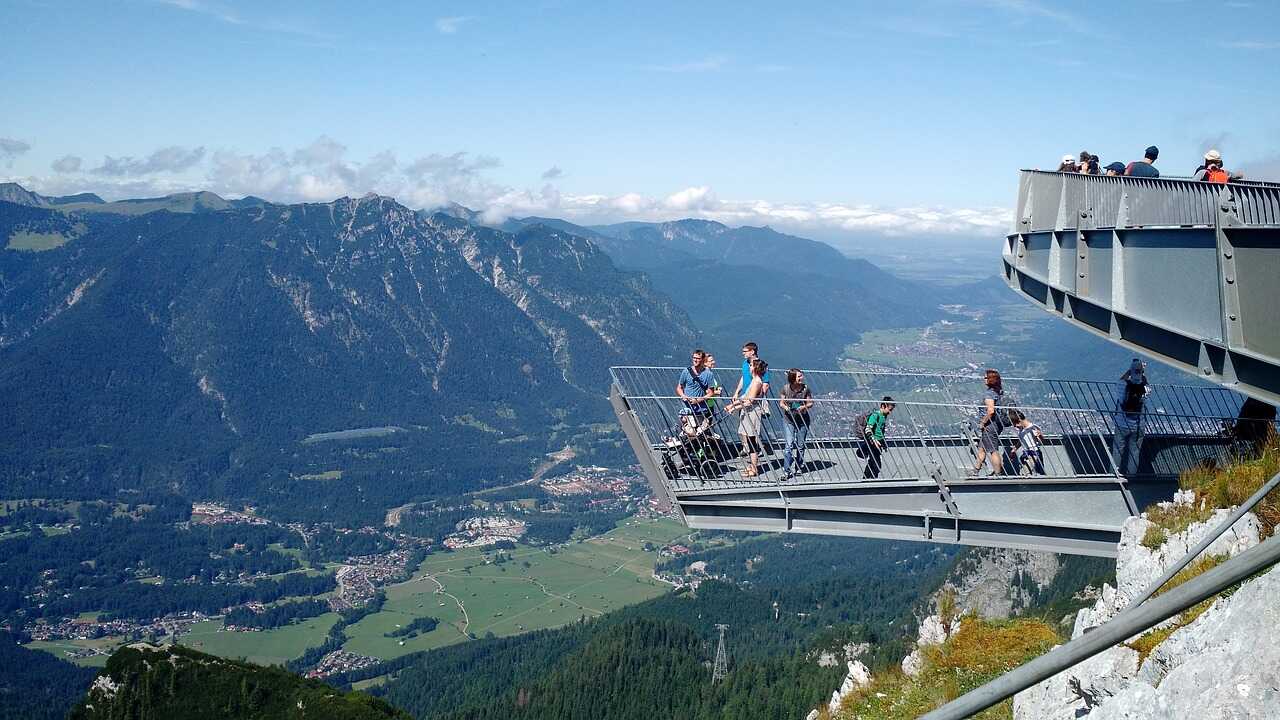

HOTELS GARMISCH-PARTENKIRCHEN 😴
12. Linderhof Castle
Linderhof Castle is one of the three castles built by King Ludwig II of Bavaria, along with Neuschwanstein Castle and Herrenchiemsee Castle. Linderhof is the smallest of these and the only one completed during the lifetime of King Ludwig II.
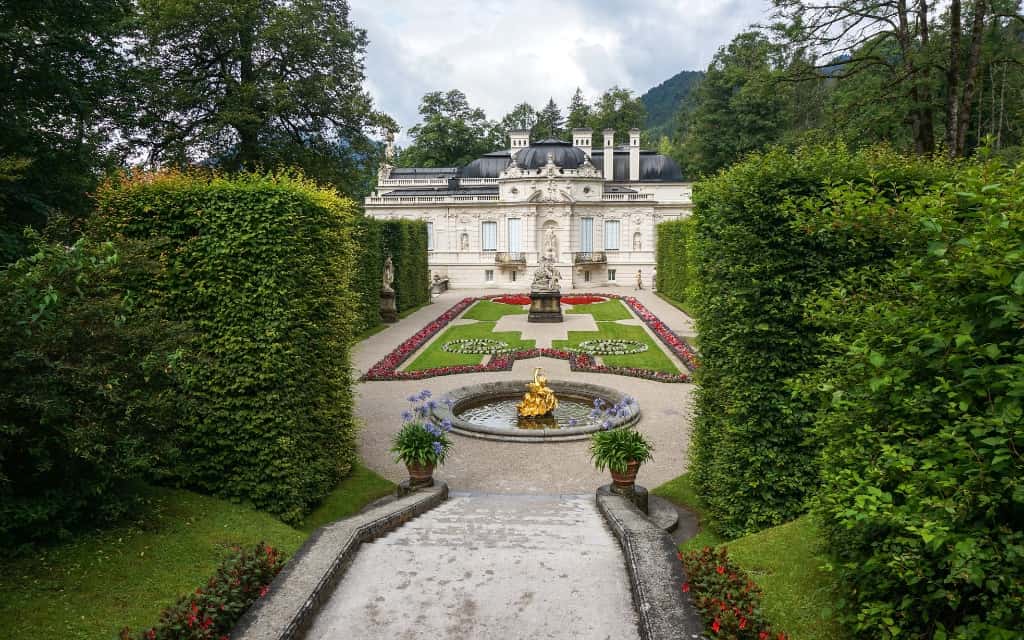
It is located in a valley near the village of Ettal. The architecture and decoration of the French chateau of Versailles were the inspiration for the construction of Linderhof.
Around the castle is a large and beautifully maintained castle park, which is full of fountains, terraces, statues and even an artificial cave.
Here you will find the latest information on admission fees and opening hours of Linderhof Castle.
How to protect yourself when travelling by car: Auto insurance provides you with car insurance to get your car repaired, towed to a garage, transported back home or a replacement vehicle if needed. They will arrange and communicate everything for you.
13. Walchensee
Walchensee is one of the largest and deepest alpine lakes in Germany, located about 75 km south of Munich.
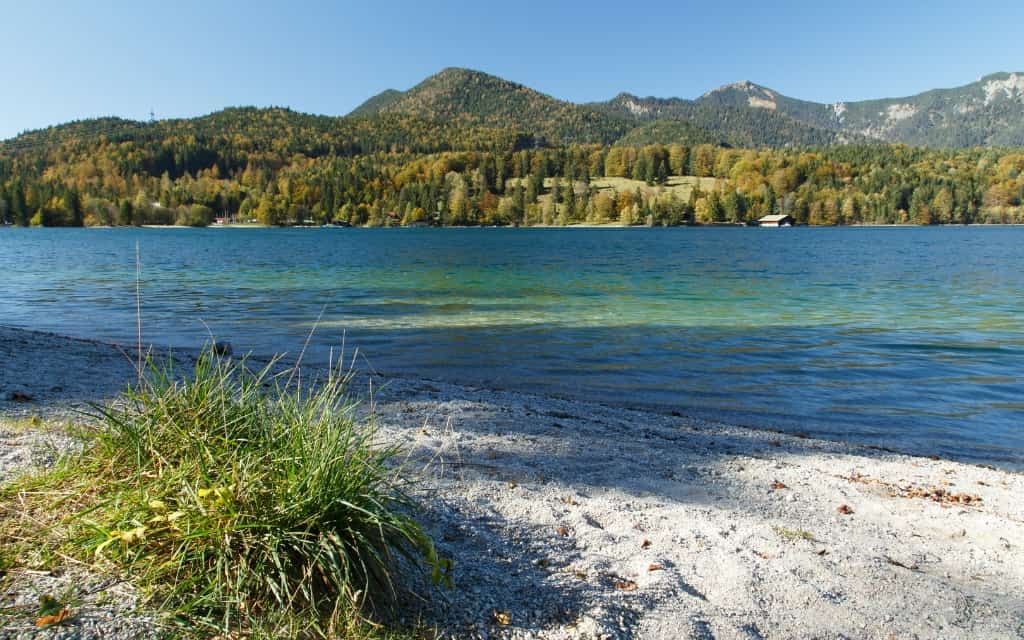
The lake is an ideal base for exploring the surrounding area and various water activities, including swimming, diving, boat or pedal boat hire. Everything you need is nearby, including shops and restaurants.
An interesting feature of the Walchensee is the Walchenseekraftwerk, a hydroelectric power station that uses the difference in altitude between the Walchensee and the Kochelsee below to generate electricity. The power station is an important industrial heritage site – if you want to find out more, the power station is open for tours.
14. Jochberg
The Jochberg is not one of the highest peaks in the area with its height of 1,567 metres, but the views of the Walchensee are fantastic.
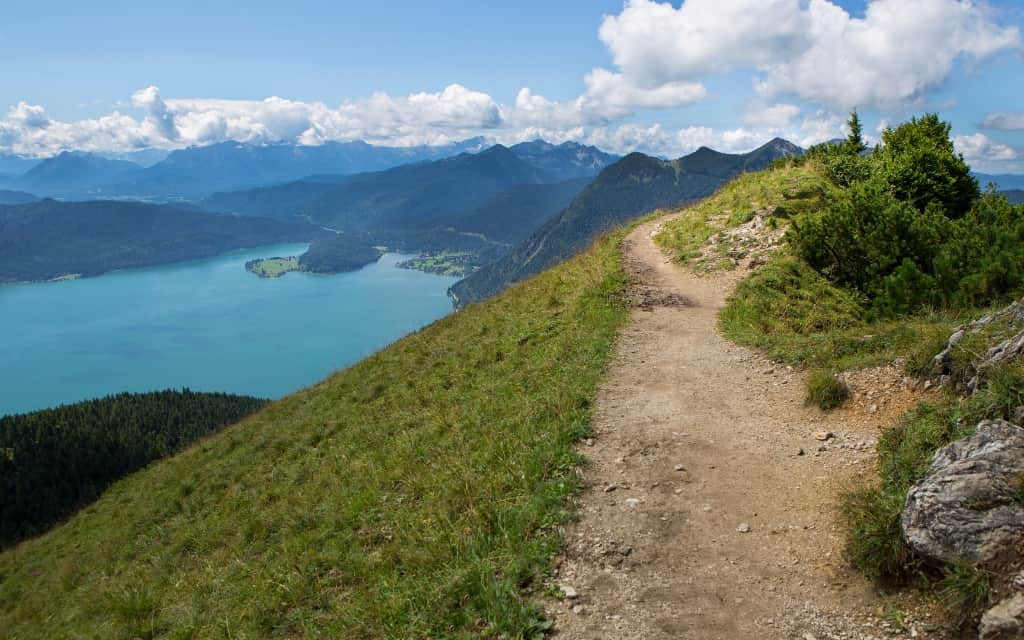
The ascent to the Jochberg is relatively straightforward, with well-marked trails, where some sections can be more challenging, but it is still a very doable route. From Walchensee you are at the top in about 1.5 hours.
A short walk from the summit, you can refresh yourself in the Jocheralm mountain hut.
15. Herzogstand
The Herzogstand is a mountain peak on Lake Walchensee, from which there are further fantastic views of the lake and the surrounding area.
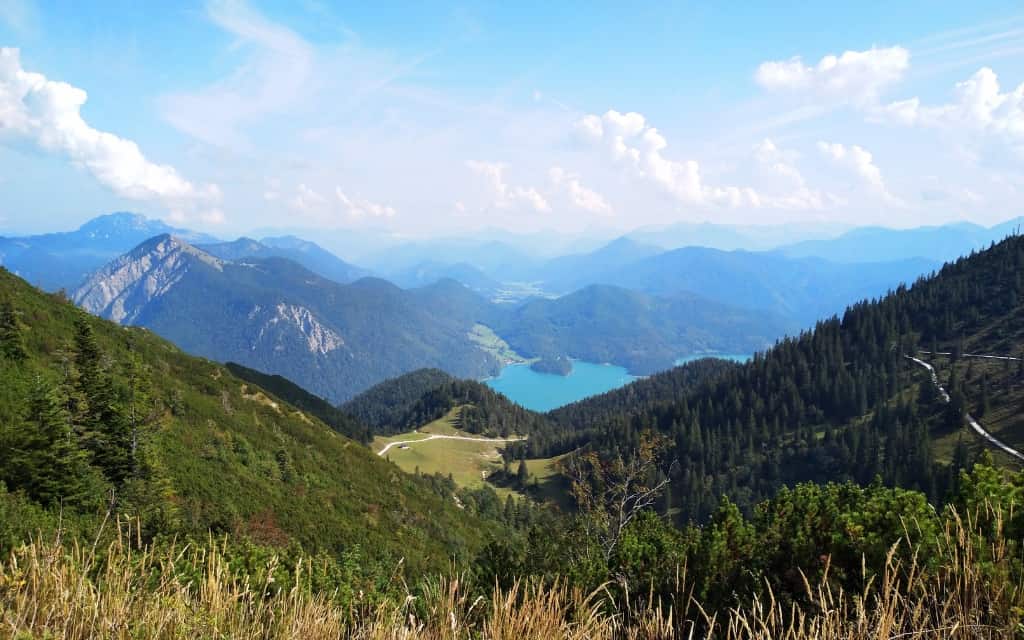
The easiest way to get up is by the Herzogstandbahn, which runs from Walchensee to the mountain hut near the summit.
A trail leads from the mountain hut to the summit, where there is a viewing platform with panoramic views of the surrounding mountains and Lake Walchensee. The journey from the mountain hut to the summit takes about an hour and is not difficult.
Hotels Walchensee:
- Alphotel Ettal: Traditional Alpine hotel in the middle price range
- Danner-Hof: Stylish hotel with excellent breakfast and wellness
- Klosterbräu Schlehdorf: Cosy, modern hotel with great value for money
16. Leutaschklamm
The Leutaschklamm, also known as the Leutascher Geisterklamm, is a beautiful gorge near the town of Mittenwald. This gorge is famous for its steep rock walls, clear waters of the turquoise blue mountain river and beautiful waterfalls.
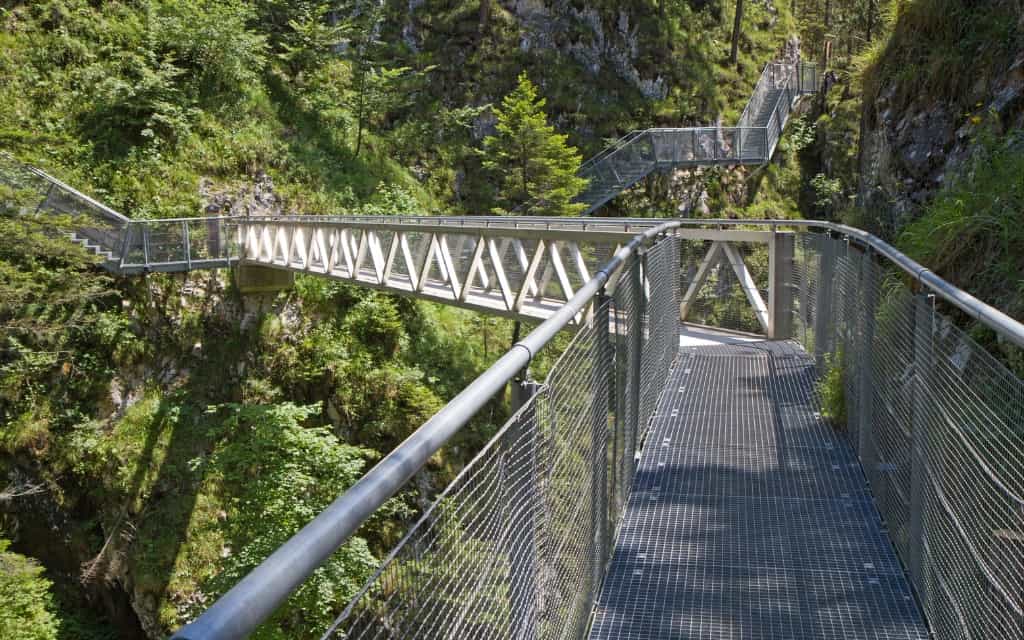
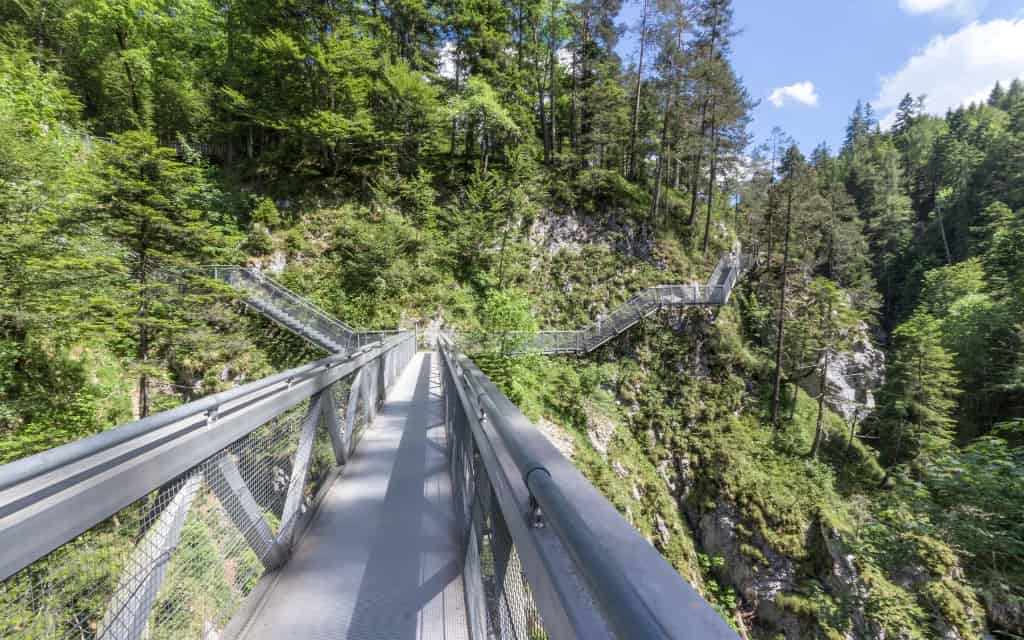
There are two routes through the Leutaschklamm Gorge to choose from – both are easy and partly over metal bridges high above the river, where you can see everything that is happening below you. The tour takes about 1-1.5 hours and is suitable for families with children.
Entrance to the Leutaschklamm is free, there is a paid parking lot at the entrance.
17. Rossfeld Panoramastraße
Rossfeld Panoramastraße is the highest panoramic road in Germany, 15.4 km long.
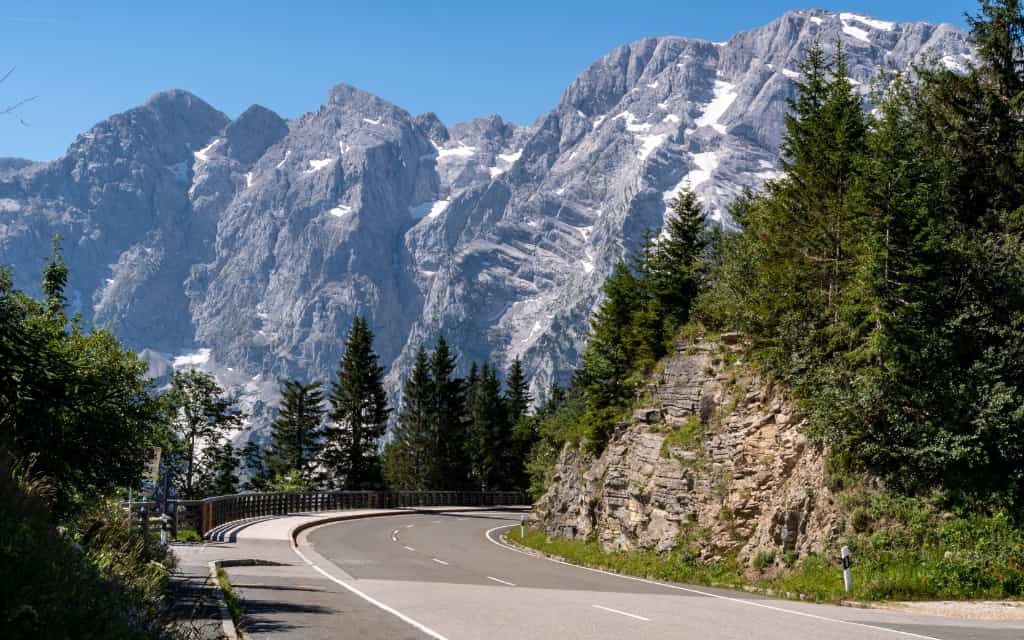
The road is beautiful in itself, but if you want more, you can stop along the way and enjoy a hike in the Berchtesgaden Alps.
On this link you will find the current price list for the Rossfeld Panoramastraße.
18. Königssee and Obersee
Most people go to Austria for the most beautiful alpine lakes. What they may not know is that Germany also has two gems on its territory – Lake Königsee and Lake Obersee in the Berchtesgaden National Park. Both lakes are extremely popular, so it’s a good idea to arrive as early in the morning as possible.
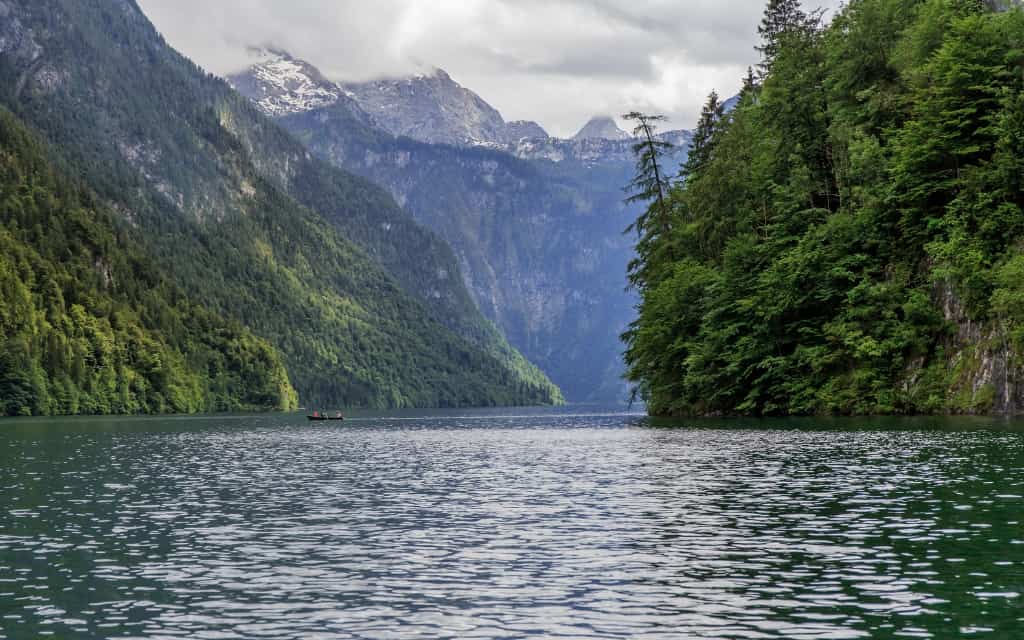
Route around Königsee
There are hiking trails around the lake, which offer the best views of the lake. The easy route leads directly from the car park, from where you turn left to the Jaenerbahn cable car along the Malerwinkel trail. The circular route is 1.5 kilometres long and is also suitable for children.
Boat cruise on the Königsee
Königssee is famous for its deep, clear blue water and is surrounded by high mountains that create a dramatic scenery. One of the lake’s most famous features is the Church of St. Bartholomew, a baroque chapel with a red onion-shaped roof that is accessible only by boat.
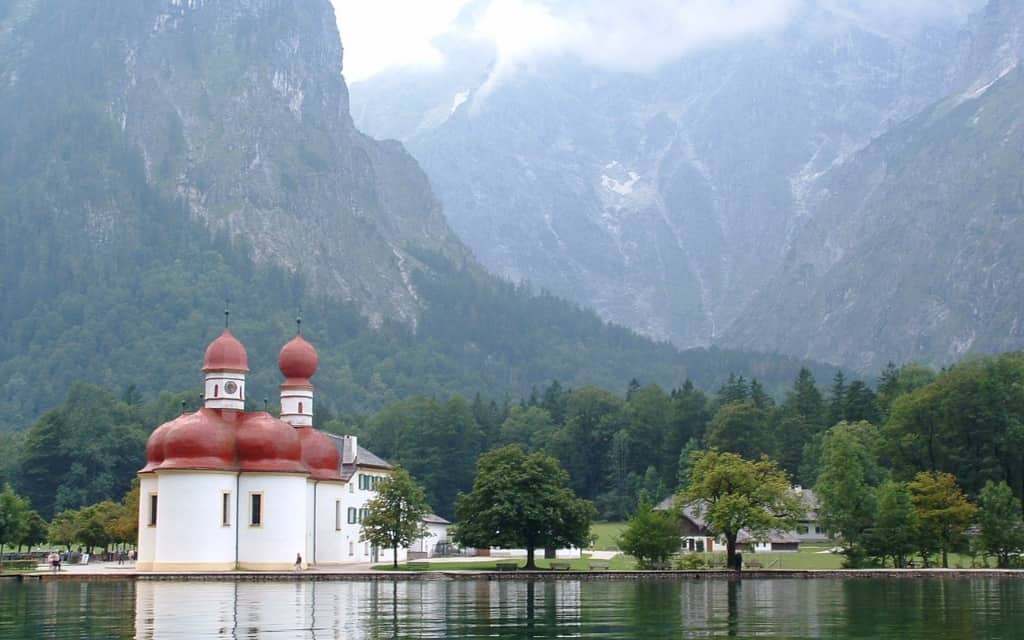
You can take a boat trip on the Königsee, which is powered by electricity and departs at regular intervals of a quarter or half an hour (depending on the season).
If you arrive by car, there is a large, paid parking lot at Königsee. The boat stops at 3 places – Kessel (a stop on the means, ideal for trekking up the mountains), at St Bartholomew’s Church where you can walk around the promenade and then visit the ice cave, and in Salet, from where it’s a short walk to Lake Obersee (for us we had to change to another boat at St Bartholomew’s Church to get to Salet, but maybe it’s already connected).
At this link you will find up-to-date information on admission fees and timetables for the Königsee.
Obersee
The Obersee is a small lake known for its turquoise water, into which a mountain face slopes down on one side. You can walk around the lake from the right to an old mountain pasture known as the Fischunkelalm, a short distance from which there is a beautiful waterfall.
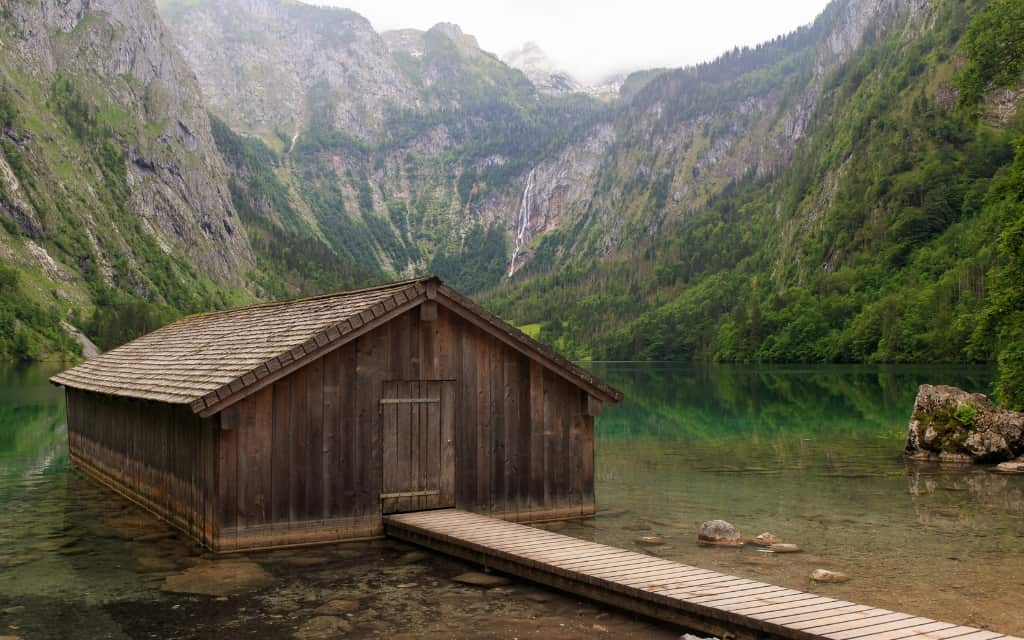
19. Almbachklamm
Near the Austrian border, in the Berchtesgaden National Park, is the Almbachklamm Gorge.
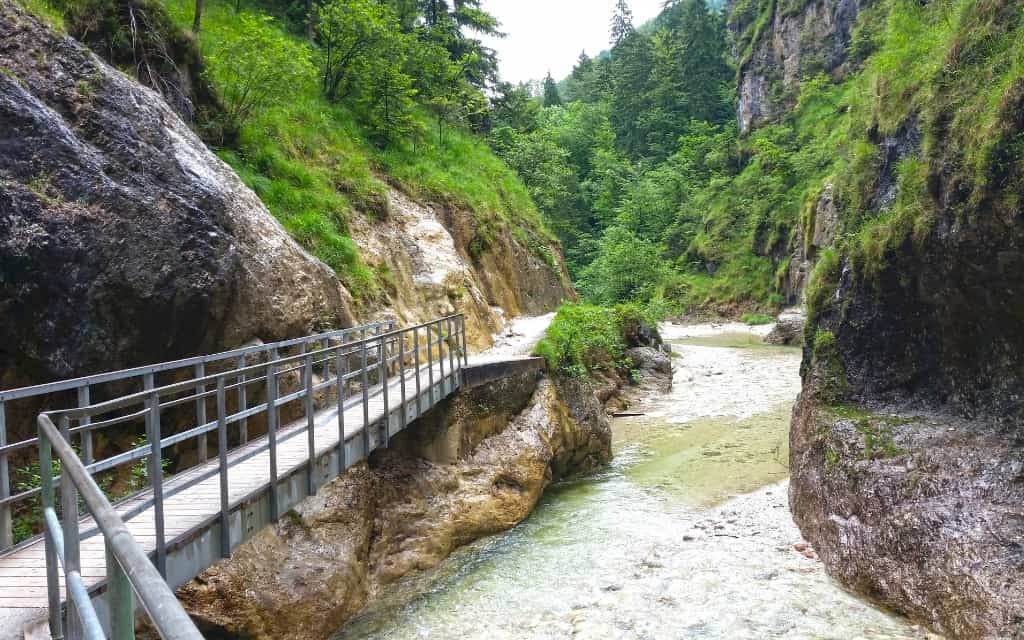
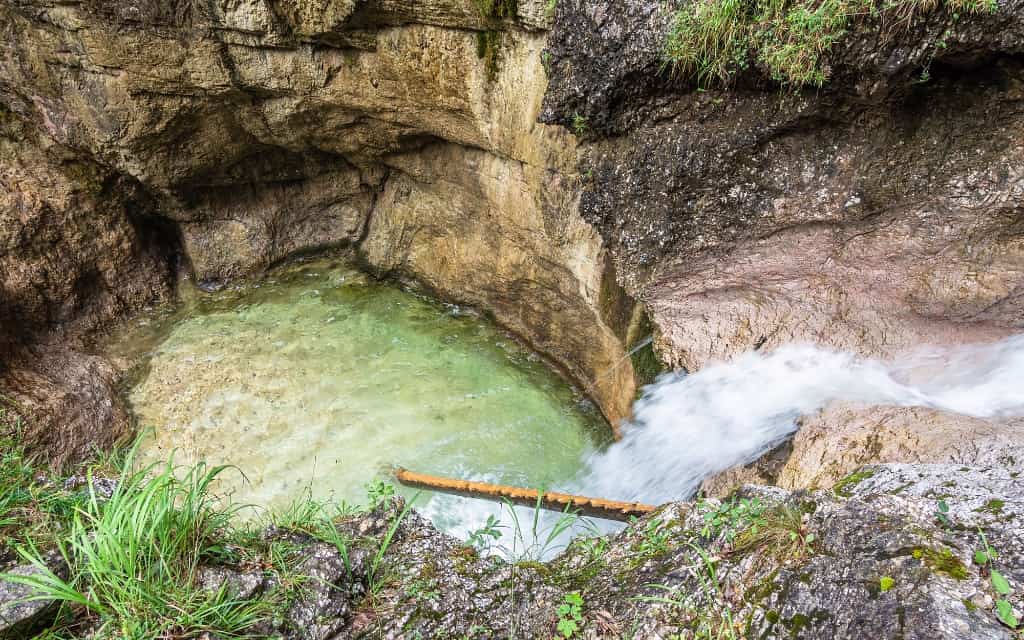
The confluence is created by the Almbach River, which cuts through the valley and creates a breathtaking terrain full of waterfalls, fast currents and steep rock walls. Almbachklamm is famous for its highest waterfall, Theresienklause, which is almost 70 metres high.
The route is about 3 kilometres long, the most interesting part is 1.5 km long. You can explore the gorge from every angle using walkways, bridges and tunnels.
The gorge is open from May to October. Here you will find the current opening hours and entrance fees to Almbachklamm.
20. Hintersee
Behind the picturesque village of Ramsau bei Berchtesgaden lies the Hintersee, which is very easily accessible. You can park directly at the lake if you are not staying nearby. Stroll around the lake or head into the heart of the Berchtesgaden Alps.
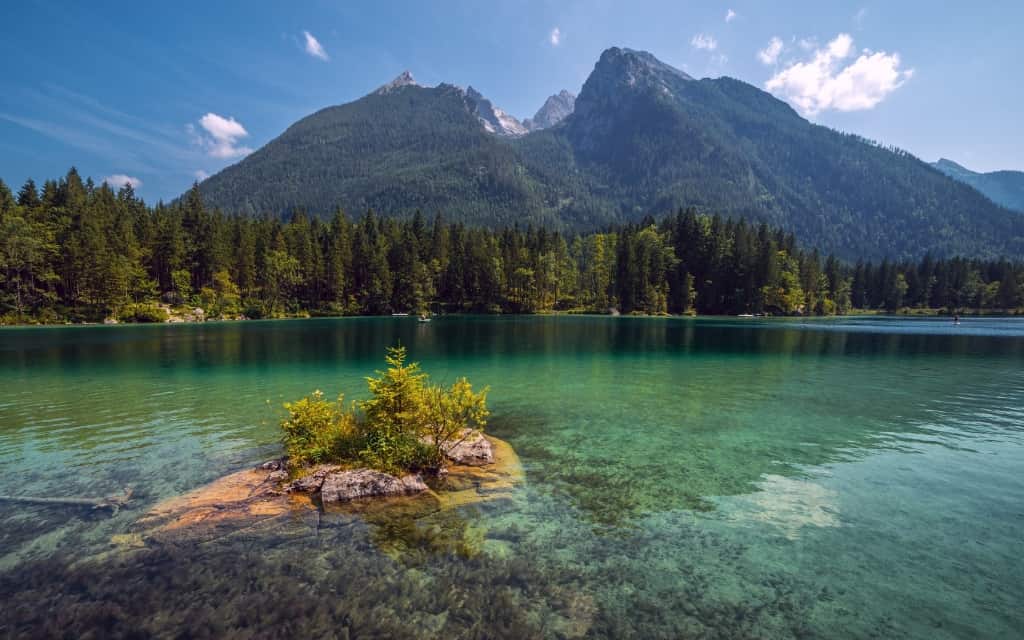
21. Herrenchiemsee Castle
Herrenchiemsee Castle, also known as the New Herrenchiemsee Palace, is the last of the three castles built by King Ludwig II of Bavaria. It is located on the island of Herreninsel on Lake Chiemsee, the largest lake in Bavaria.
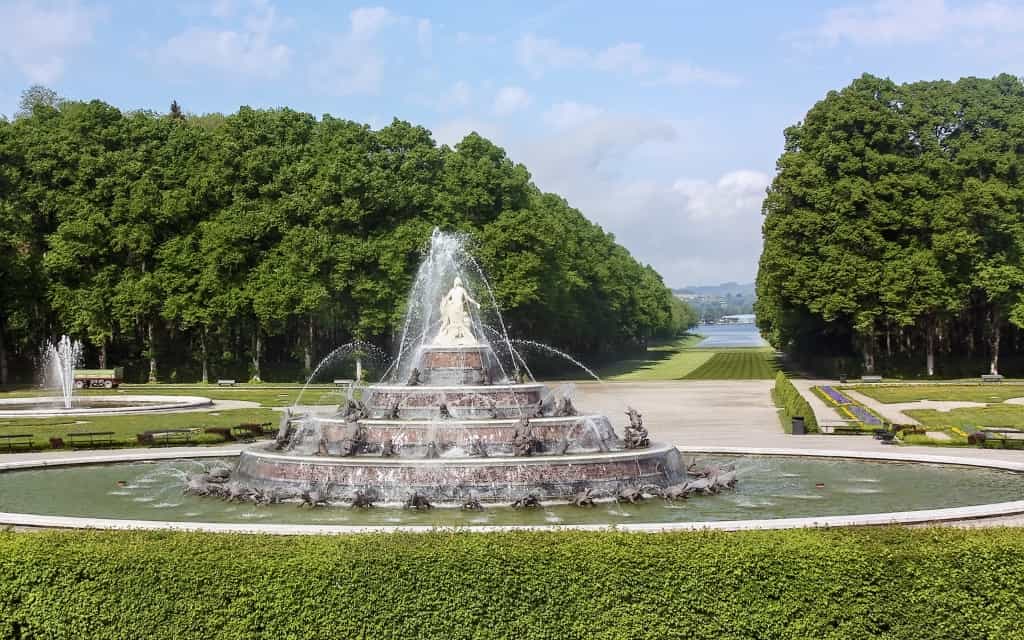
Like Linderhof Castle, Herrenchiemsee Castle was inspired by the French palace at Versailles and was intended as a tribute to King Louis XIV, who was admired by King Louis II.
The castle has similar architecture and extensive gardens full of fountains and statues. Inside, it houses ornate interiors and the Hall of Mirrors, which is a replica of the Hall of Mirrors at Versailles.
How to get to Herrenchiemsee Castle: you will find the castle right on Lake Chiemsee. The castle can only be reached by boat from several villages around Chiemsee. The castle is most easily reached from Prien am Chiemsee, where there is a paid parking lot.
Tickets: here you can find the latest information about entrance fees and opening hours.
22. Salt mine Salzbergwerk Berchtesgaden
The Salzbergwerk Berchtesgaden, also known as the Berchtesgaden Salt Mine, is one of the oldest active salt mines in the world.
The mine was founded in the 12th century and has played a key role in the region’s economy throughout its long history. Today it is a popular attraction where you can learn more about the importance and history of salt mining.
Enjoy a ride on the mine train, ride down the long wooden chutes that were once used to transport miners, and cruise across the underground salt lake. Ideal place for families with children.
At this link you will find the current opening hours and admission fees for the Salzbergwerk Berchtesgaden.
23. Eagle’s Nest
The Eagle’s Nest (Kehlsteinhaus) is the former retreat of Adolf Hitler, located on the top of the Kehlstein mountain near Berchtesgaden.
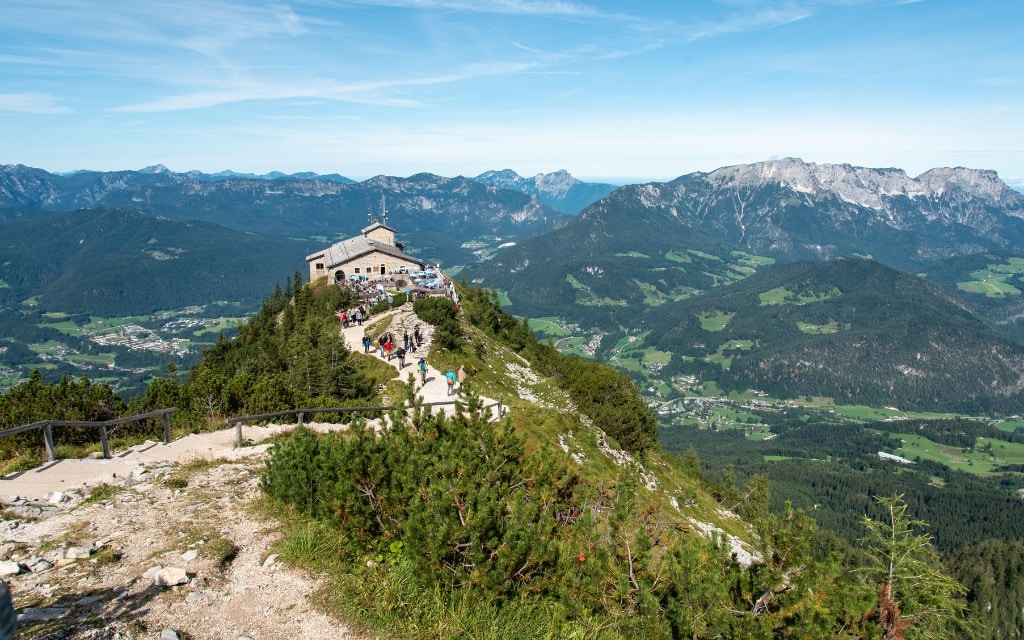
After World War II, the building was spared from bombing because it was difficult to see from the air. After the war, the Kehlsteinhaus was opened to the public as a restaurant and lookout. There is also a museum documenting the history of the area during the Nazi era.
How to get to the Eagle’s Nest: The Kehlsteinhaus can be reached by bus from the car park – preferably first thing in the morning, as it is already crowded in the morning. From the bus, you go through a tunnel to the historic elevator, which takes you to the top.
The other option is to walk – allow about 2 hours for the ascent.
Tip: This popular day trip from Prague includes a visit to the Eagle’s Nest and Lake Königssee.
More information about the Eagle’s Nest can be found on the official website.
HOTELS BERCHTESGADEN 😴
German Alps – map
HOW TO USE THIS MAP: Above you will find a detailed map of things to do in the Bavarian Alps in Germany. Click at the top left of the map to see separate layers with highlighted locations. You can hide and show the different layers or click on the icons on the map to see the names of the places mentioned in the Bavarian Alps guide. If you want to save the map, star it. It will then be saved to your Google Maps and can be retrieved at any time on your mobile phone or computer. For a larger version of the map, click on the icon in the top right corner.
This was our hiking tips and things to do in the Bavarian Alps in Germany. Do you have a question? We’ll be happy to answer it in the comments below. Have a safe journey!
More information about Germany
GERMANY: Get inspired with tips on things to do in Germany.
BERLIN: Berlin has something for everyone – take your pick from our tips on what to see in Berlin.
HAMBURG: Hamburg is considered by some to be the most beautiful city in Germany. Take a look at our tips on things to do in Hamburg and form your own opinion.
DRESDEN: Dresden is one of the most beautiful cities in Germany – here are tips on things to do in Dresden.
AUSTRIAN ALPS:Here are the things to do in the Austrian Alps. Or head straight to Tyrol or the High Tauern National Park. Other popular destinations in the Austrian Alps are the Dachstein mountain range or the beautiful Lake Achensee.
Zell am See is one of the most popular areas to stay in the Austrian Alps. Here is a detailed travel guide and things to do at Zell am See.
Wolfgangsee is one of Austria’s most beautiful lakes, with swimming opportunities and plenty of activities in the surrounding area.
